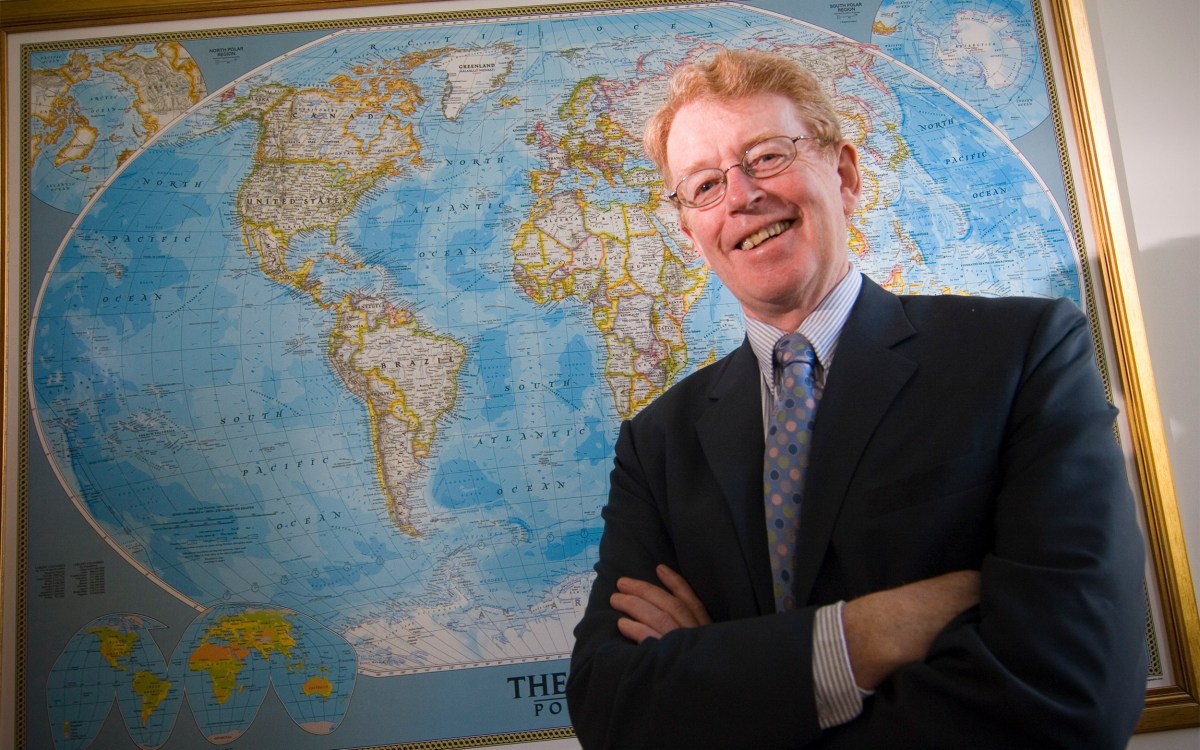John Rawls, influential political philosopher, dead at 81 :
Author of “A Theory of Justice” was James Bryant Conant University Professor Emeritus

John Rawls, the James Bryant Conant University Professor Emeritus, whose 1971 book, “A Theory of Justice” argued persuasively for a society based on equality and individual rights, died Nov. 24 at the age of 81.
Rawls is considered by many to be the most important political philosopher of the 20th century and a powerful advocate of the liberal perspective. His work continues to be a major influence in the fields of ethics, law, political science, and economics, and has been translated into 27 languages.
Harvard University President Lawrence H. Summers said, “I am deeply saddened by the death of John Rawls. He combined profound wisdom with equally profound humanity. Few, if any modern philosophers have had as decisive an impact on how we think about justice. Scholars in many different fields will continue to learn from him for generations to come.”
William Kirby, dean of the Faculty of Arts and Sciences, said, “John Rawls’ consideration of questions of social justice has marked him as one of the greatest political theorists of our time. His analyses of the conditions, present and wished for, under which we pursue the great questions of right living in a pluralistic society reveal his probity and his searching quality of mind. We are very sad to know of his passing. This is a grave loss for Harvard, and for philosophy.”
Philosophy Department Chairman Thomas Scanlon, the Alford Professor of Natural Religion, Moral Philosophy, and Civil Policy, said that “John Rawls was widely recognized as the greatest political philosopher of the 20th century. His work revived and reshaped the entire field, and its profound influence on the way justice is understood and argued about will last long into the future. He was also a remarkable teacher, who inspired countless students, and an unfailingly generous and devoted colleague. We will miss him greatly and are all deeply grateful to have had the privilege of being around when he was here.”
Stanley Hoffmann, the Paul and Catherine Buttenwieser University Professor, said of Rawls: “This gentle, modest and thoughtful man has revived the philosophy of liberalism that had been for so long mired in its glorious past and ridiculed by its enemies. His colossal attempt to adapt it to the circumstances of the 20th century, to the age of democracy, but also totalitarianism, world wars, and mass poverty, his emphasis both on diversity and on consensus, his scrutiny of democratic citizenship and of the requirements of justice, his influence on disciples he treated as his equals, will continue to inspire us and to deserve our gratitude. He was a great thinker and a good man, and many of us feel orphaned.”
Charles Fried, the Beneficial Professor of Law at Harvard, said of Rawls, “He was the dominant figure in political and moral philosophy in the second half of the 20th century. He developed an approach to the questions of moral and political philosophy which was substantive and analytic at the same time, proposing concrete answers to many questions.”
Dennis Thompson, the Alfred North Whitehead Professor of Political Philosophy and director of the University Center for Ethics and the Professions, stated that in his view Rawls “will be in the canon for centuries, along with Hobbes, Locke, Rousseau, Kant, and Mill.” Rawls was a senior fellow in the Center for Ethics and the Professions from its beginning in 1986 and was personally engaged in the work of the center until his illness made active participation impossible.
In “A Theory of Justice,” Rawls sets forth the proposition that “Each person possesses an inviolability founded on justice that even the welfare of society as a whole cannot override. Therefore, in a just society the rights secured by justice are not subject to political bargaining or to the calculus of social interests.”
Born in Baltimore, Rawls attended the Kent School in Kent, Conn., and earned a B.A. degree from Princeton in 1943. From 1943 to 1945 he served in New Guinea, the Philippines, and Japan as an enlisted man in the U.S. infantry, later describing his military career as “singularly undistinguished.” He returned to Princeton in 1946 to take up graduate studies, receiving his Ph.D. in philosophy in 1950.
Before joining the Harvard Philosophy Department in 1962, he was an instructor at Princeton (1950-52), assistant and associate professor of philosophy at Cornell (1953-59), and professor of philosophy at the Massachusetts Institute of Technology (1960-62). He was appointed the Conant University Professor at Harvard in 1979. University professors hold Harvard’s highest professorial posts. These special endowed positions were established in 1935 by the President and Fellows of Harvard College for “individuals of distinction … working on the frontiers of knowledge, and in such a way as to cross the conventional boundaries of the specialties.”
In addition to “A Theory of Justice,” nominated for a National Book Award, his publications include “Political Liberalism” (1993), “The Law of Peoples” (1999), “Collected Papers” (1999), “Lectures on the History of Moral Philosophy” (2000), and “Justice as Fairness: A Restatement” (2001).
He was a member of the American Philosophical Association (president, 1974), the American Academy of Arts and Sciences, the American Association of Political and Legal Philosophy (president, 1970-72), the American Philosophical Society, the British Academy, and the Norwegian Academy of Sciences. In 1999, he received the National Humanities Medal from the National Endowment for the Humanities.
Rawls died of heart failure at his home in Lexington. He had suffered a series of debilitating strokes that eventually left him unable to work. He leaves his wife, Margaret Warfield Fox Rawls, four children – Anne Warfield, Robert Lee, Alexander Emory, and Elizabeth Fox – and four grandchildren.
A memorial service was held on Dec. 3 in Lexington.




